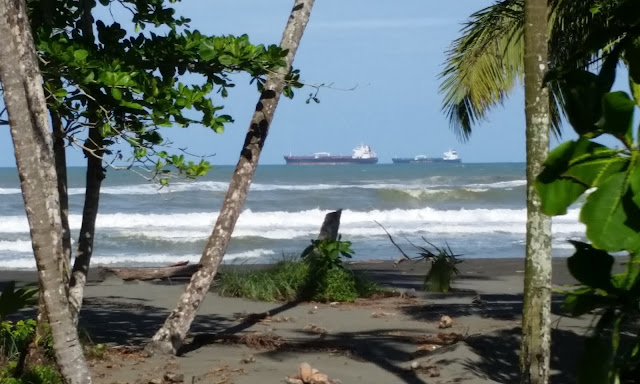Beyond Bananaland
 |
| Old Banana Railway, Moín, Costa Rica |
I’m troubled by the macro complaints of the Pope, the Dalai
Lama, celebrities, and the countless other pontificators in their denunciation
of world poverty. Wait—I know your first thought my be that I am somehow
discounting their gripes; I am most certainly not! It took a research
expedition to Central and South America recently to gain a little perspective
on the matter. The trip was almost everything I expected. Almost. That is,
until the perceived-from-a-distance view blew up in my face. Please allow me to
explain…
SPOLIER ALERT?
SPOLIER ALERT?
I’m currently researching locations for two upcoming novels. On-the-ground info is sparse for certain Latin American locations, hence the voyage. A slow ship into the southern Caribbean. Why hurry? Might as well enjoy it.
I won’t go into the research details for obvious reasons, but I can share some of the locations. We were guided through the insane city streets of Cartagena, Colombia, through the Gatun locks of the Panama Canal, into the Panamanian countryside in throughout Captain Morgan’s plunders of Old Panama City. We also traversed the mountains, jungles and plantations of eastern Costa Rica, proximate to the town of Estrada. The word “dichotomy” repeatedly materialized in my thoughts. There is a constant contrast between rich and poor in each location. The middle class is missing. The poor are dirt poor, that is. It’s awful to witness so many people suffer.
Yes, suffer.
My stomach turned at the sight of so many banana-laden cargo
ships headed to global ports. It’s an ignorant bliss thing, now ruined.
Previously, I didn’t think twice of the pennies we pay for each pound of the
fruit. Bananas are cheap. I realize now that they are inexpensive because the
plantation managers—Dole, Del Monte, Chiquita, etc.— who produce them on the
backs of thousands of manual laborers who each receive maybe a couple hundred
dollars each month.
Now this is the part Pope Francis et al have right. It’s a shame. Shouldn’t we pay more for those bananas, or would those greedy corporations just stick it in their coffers? We can’t be naïve in response. We know. Deep down, we know. It’s been this way since the beginning of mankind. Greed. Empires. Familial wealth and power. Dynasties. And yet, somehow, the United States of America, many European countries, Australia, and now other emerging economies, eked out a middle class through revolt and regulation. For certain, we still have dirt poor in our rich countries, but nothing on the scale of the labor regions—China, Latin America, Africa and much of the Middle-East. It’s awful.
Now this is the part Pope Francis et al have right. It’s a shame. Shouldn’t we pay more for those bananas, or would those greedy corporations just stick it in their coffers? We can’t be naïve in response. We know. Deep down, we know. It’s been this way since the beginning of mankind. Greed. Empires. Familial wealth and power. Dynasties. And yet, somehow, the United States of America, many European countries, Australia, and now other emerging economies, eked out a middle class through revolt and regulation. For certain, we still have dirt poor in our rich countries, but nothing on the scale of the labor regions—China, Latin America, Africa and much of the Middle-East. It’s awful.
So, yes, the Dalai Lama, Pope, etc. have a valid point.
There is a reason for the poverty, certainly, and it’s oh so simple to spot and
treat. Look at those shacks! Look, they have exposed or no plumbing! Look at
the dirty clothes and bad teeth! Look at all the trash in the streets! Yes,
it’s easy to spot. That is, until you notice that almost every one of those tiny,
decrepit tin shacks has satellite dish from Claro on the roof. Eyes roll, and
then that poor little kid chasing your railcar with his grungy puppy suddenly
whips out a cell phone from his back pocket to snap a few parting shots.
What just happened?
That’s the problem; they’re poor and misguided. Basics necessities, values, and dignity have been supplanted by electronic pacifiers. Unreal. Vomitus. What is to be done about that?
Here are more photos. Tell me what you think!
 |
| Panama City, Panama - you can't quite cover it up with billboards |
 |
| Cartagena, Colombia (a nicer part). Expensive gasoline means motorcycles everywhere. |
 |
| A trucker's digs outside Estrada, Costa Rica |
 |
| A common nest of power lines in Cartagena. Not the most outrageous observed example. |
 |
| Reportedly a vacation farm shack off the coast above Moín, Costa Rica. Eco-tourists or city dwellers from San Jose needing space. We saw a few of these with either hammocks or cow garages underneath. |
 |
| Departing Estrada, Costa Rica |
 |
| Rusted bridge in Costa Rica (missed the river name) ...too rusted. |
Oops! Almost conveniently forgot.: My itinerary included a scheduled stop by Ian Fleming’s former estate “Goldeneye” in Oracabessa, Jamaica. While I managed to get his north shore vantage—and what a location to spend your mornings in front of a Royal Quiet Deluxe typewriter!—our hired transport was overly pessimistic enough to can the idea of photobombing Fleming’s seaside bunk. It’s a private resort now, owned by famed Island Records (Bob Marley, U2) founder Chris Blackwell. If you’re lucky enough to get an invite and the estate isn’t booked, fantastic. Otherwise, it’ll cost you a cool $4,500 per night to get inside.
 |
| North coast of Jamaica near Dunn's River Falls. What would Ian think of all the tourists? |



